Unit 10 I’d like some noodles.单元考点精讲课件(41张PPT)
文档属性
| 名称 | Unit 10 I’d like some noodles.单元考点精讲课件(41张PPT) | 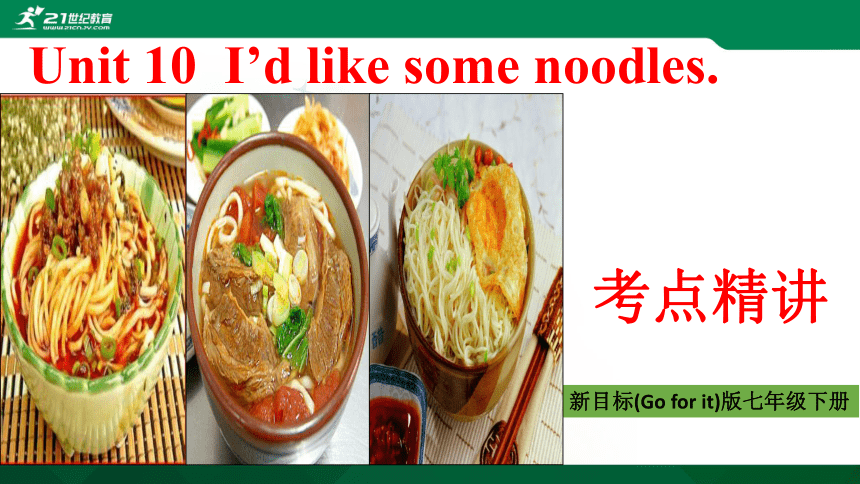 | |
| 格式 | pptx | ||
| 文件大小 | 1.8MB | ||
| 资源类型 | 试卷 | ||
| 版本资源 | 人教新目标(Go for it)版 | ||
| 科目 | 英语 | ||
| 更新时间 | 2023-01-29 21:25:59 | ||
图片预览

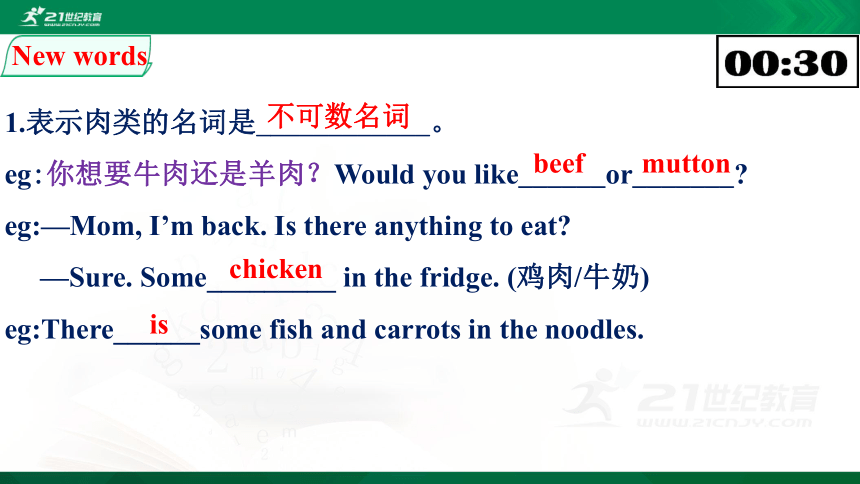
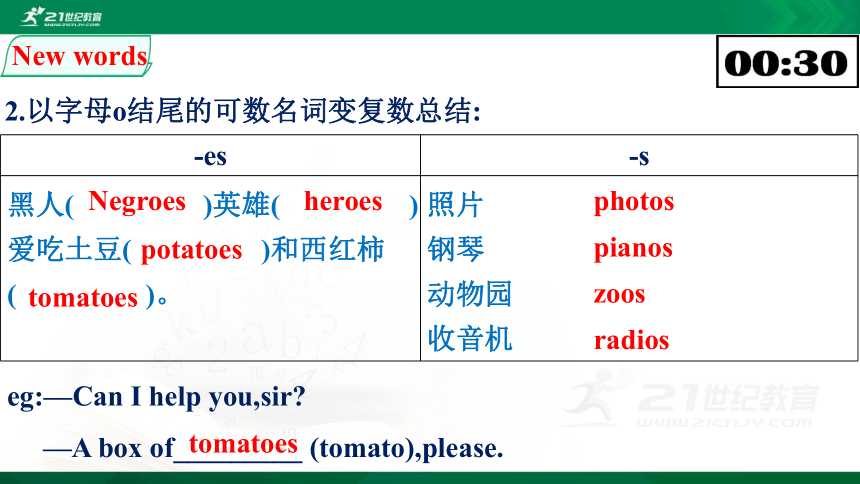
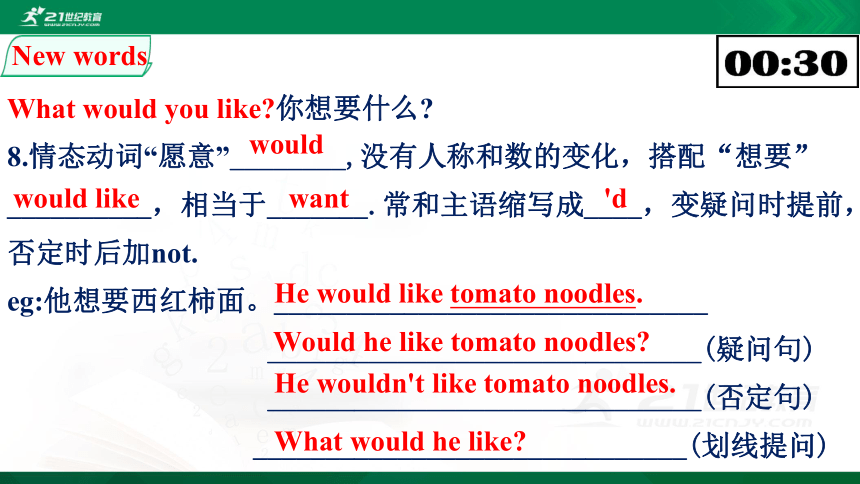
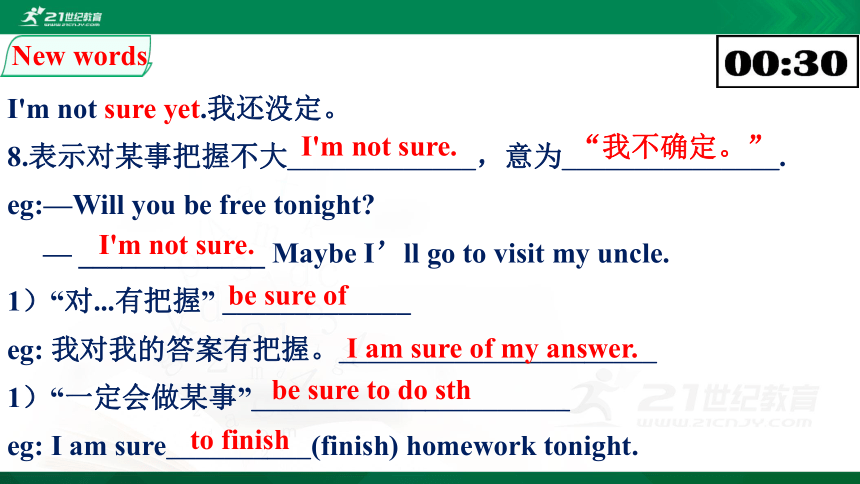
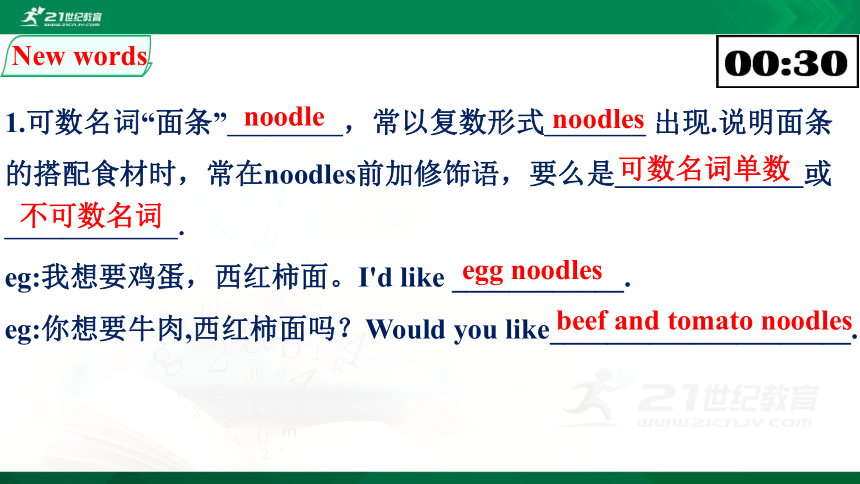
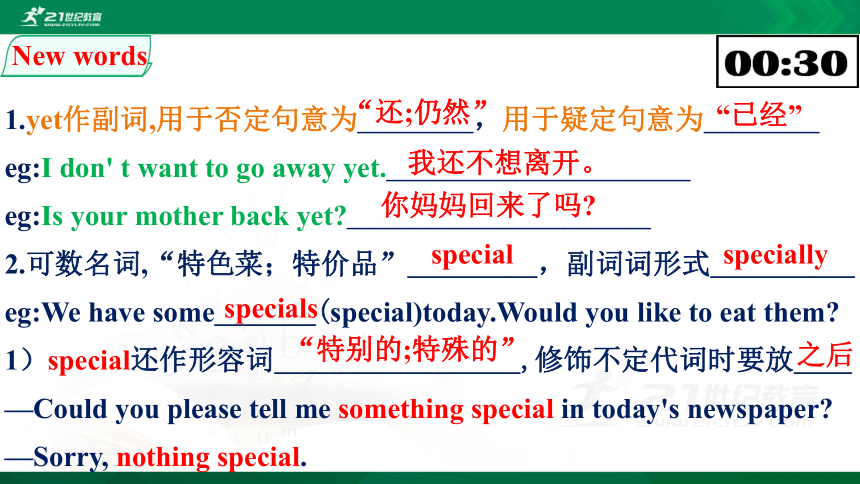
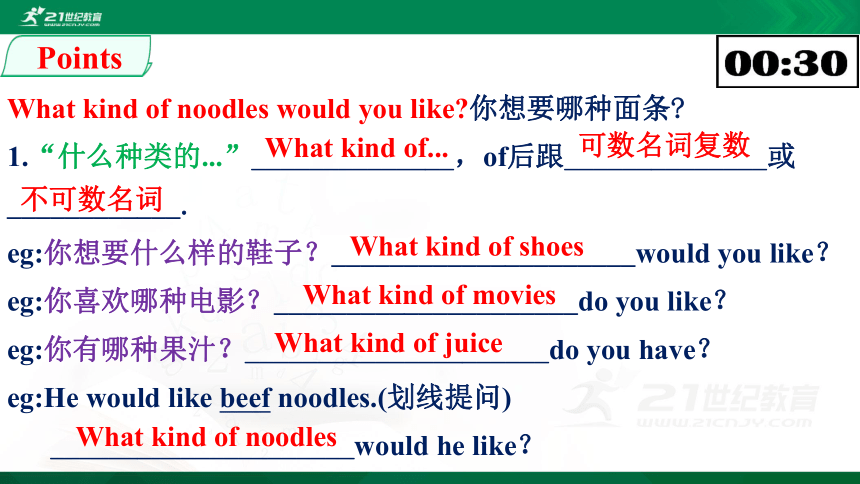
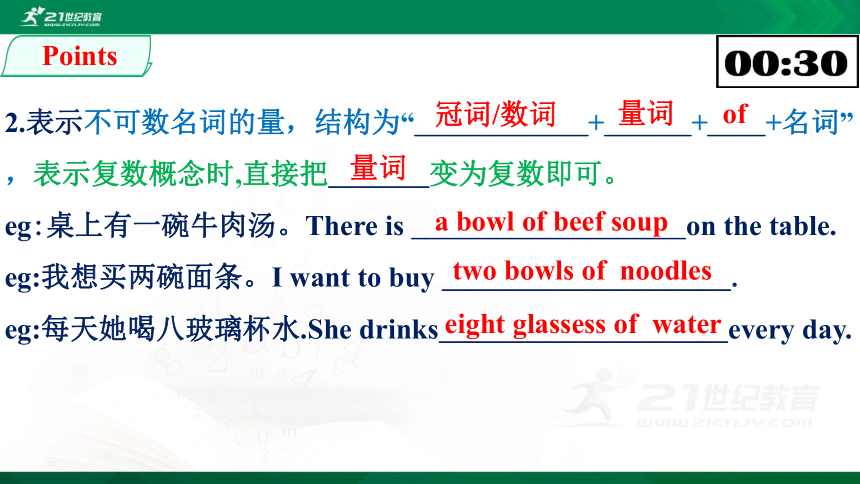
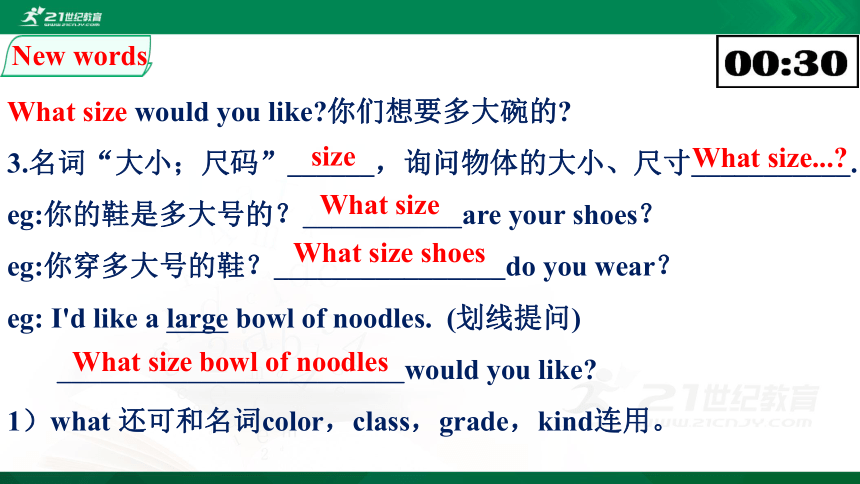
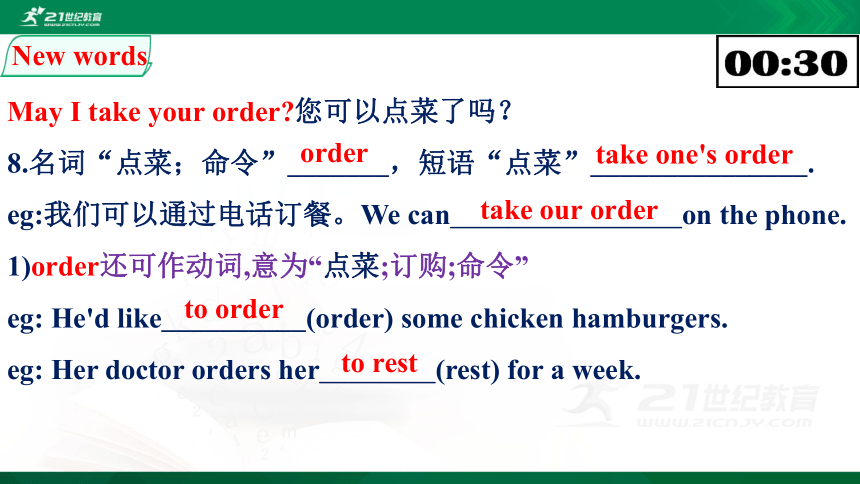
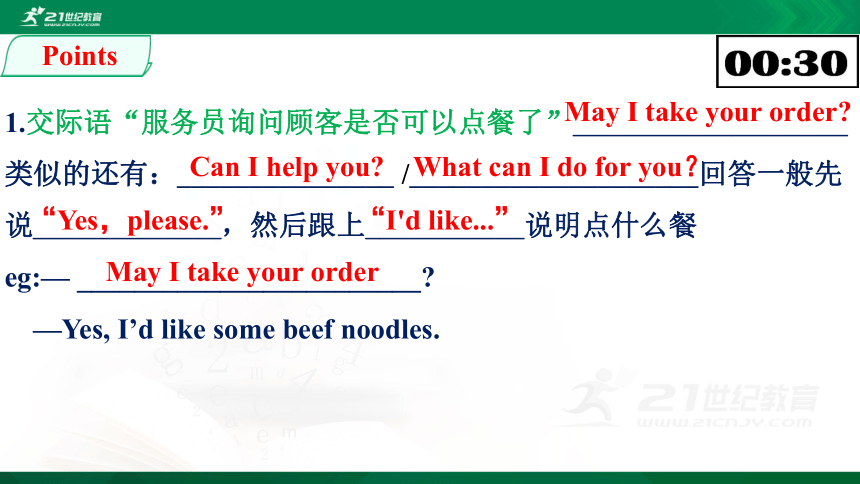
文档简介
(共41张PPT)
考点精讲
新目标(Go for it)版七年级下册
Unit 10 I’d like some noodles.
1.表示肉类的名词是____________。
eg:你想要牛肉还是羊肉?Would you like______or_______
eg:—Mom, I’m back. Is there anything to eat
—Sure. Some_________ in the fridge. (鸡肉/牛奶)
eg:There______some fish and carrots in the noodles.
不可数名词
New words
beef
mutton
chicken
is
2.以字母o结尾的可数名词变复数总结:
New words
-es -s
黑人( )英雄( )爱吃土豆( )和西红柿( )。 照片
钢琴
动物园
收音机
Negroes
heroes
potatoes
tomatoes
photos
pianos
zoos
radios
eg:—Can I help you,sir
—A box of_________ (tomato),please.
tomatoes
What would you like 你想要什么
8.情态动词“愿意”________,没有人称和数的变化,搭配“想要”
__________,相当于_______.常和主语缩写成____,变疑问时提前,否定时后加not.
eg:他想要西红柿面。______________________________
______________________________(疑问句)
______________________________(否定句)
______________________________(划线提问)
New words
would
want
would like
'd
He wouldn't like tomato noodles.
He would like tomato noodles.
What would he like
Would he like tomato noodles
I'm not sure yet.我还没定。
8.表示对某事把握不大_____________,意为_______________.
eg:—Will you be free tonight
— _____________ Maybe I’ll go to visit my uncle.
1)“对...有把握” _____________
eg: 我对我的答案有把握。______________________
1)“一定会做某事”______________________
eg: I am sure__________(finish) homework tonight.
New words
I'm not sure.
I'm not sure.
“我不确定。”
be sure of
to finish
I am sure of my answer.
be sure to do sth
1.可数名词“面条”________,常以复数形式_______ 出现.说明面条的搭配食材时,常在noodles前加修饰语,要么是_____________或
____________.
eg:我想要鸡蛋,西红柿面。I'd like ____________.
eg:你想要牛肉,西红柿面吗?Would you like_____________________.
noodle
New words
noodles
不可数名词
可数名词单数
egg noodles
beef and tomato noodles
1.yet作副词,用于否定句意为________,用于疑定句意为________
eg:I don' t want to go away yet._____________________
eg:Is your mother back yet _____________________
2.可数名词,“特色菜;特价品”_________,副词词形式__________
eg:We have some_______(special)today.Would you like to eat them
1)special还作形容词_________________,修饰不定代词时要放____
—Could you please tell me something special in today's newspaper
—Sorry, nothing special.
“还;仍然”
New words
“已经”
我还不想离开。
你妈妈回来了吗
special
specially
specials
“特别的;特殊的”
之后
What kind of noodles would you like 你想要哪种面条
1.“什么种类的...”______________,of后跟______________或
____________.
eg:你想要什么样的鞋子?_____________________would you like?
eg:你喜欢哪种电影?_____________________do you like?
eg:你有哪种果汁?_____________________do you have?
eg:He would like beef noodles.(划线提问)
_____________________would he like?
Points
What kind of...
不可数名词
可数名词复数
What kind of shoes
What kind of juice
What kind of movies
What kind of noodles
2.表示不可数名词的量,结构为“____________+______+____+名词”,表示复数概念时,直接把_______变为复数即可。
eg:桌上有一碗牛肉汤。There is ___________________on the table.
eg:我想买两碗面条。I want to buy ____________________.
eg:每天她喝八玻璃杯水.She drinks____________________every day.
冠词/数词
Points
量词
of
量词
a bowl of beef soup
two bowls of noodles
eight glassess of water
What size would you like 你们想要多大碗的
3.名词“大小;尺码”______,询问物体的大小、尺寸___________.
eg:你的鞋是多大号的?___________are your shoes?
eg:你穿多大号的鞋?________________do you wear?
eg: I'd like a large bowl of noodles. (划线提问)
________________________would you like
1)what 还可和名词color,class,grade,kind连用。
New words
size
What size
What size...
What size shoes
What size bowl of noodles
May I take your order 您可以点菜了吗?
8.名词“点菜;命令”_______,短语“点菜”_______________.
eg:我们可以通过电话订餐。We can________________on the phone.
1)order还可作动词,意为“点菜;订购;命令”
eg: He'd like__________(order) some chicken hamburgers.
eg: Her doctor orders her________(rest) for a week.
New words
order
take our order
take one's order
to order
to rest
1.交际语“服务员询问顾客是否可以点餐了”___________________
类似的还有:_______________ /____________________回答一般先说_____________,然后跟上___________说明点什么餐
eg:— ________________________
—Yes, I’d like some beef noodles.
May I take your order
Points
“Yes,please.”
“I'd like...”
Can I help you
What can I do for you?
May I take your order
We'd also like gongbao chicken and some mapo tofu with rice.
我们还想要宫保鸡丁和麻婆豆腐和米饭。
(1)表示伴随,________________
eg:你能和我一起去看电影吗?Can you go to a movie__________
(2)________________。
eg:他是个长着短发的高个子男孩。He’s a tall boy_____________.
(3)表示使用工具,手段,_____________。
eg:他用铅笔写。He writes_____________.
Points
“和……在一起”
“带有,具有”
with me
with short hair
“用……”
with用法归纳
with a pencil
1.指人或事物名称的词叫_____,可分为_________和___________
名词
可数名词
不可数名词
Grammar
可数名词 不可数名词
定义 可以用数词计数的名词 不可以用数词计数的名词
不 同 点 1. 可以用_______及_______修饰 1.不用不定冠词及数词修饰, _____________________________
2. 有_______和________形式 2.没有________形式
3. 可数名词做主语时,谓语动词的数由_______________来决定 3.不可数名词作主语时,谓语动词用______
a/an
数词
复数
可数名词的数
单数
冠词/数词+量词+of+不可数名词
单数
复数
2. 可数名词单数变复数时的变化规则:
一般情况下在词尾加___________。
以__________________结尾的名词在词尾加 es。
class—classes , box—boxes
以______结尾的名词__________在词尾加 es__________加 s。
zoo—zoos , radio—radios tomato—tomatoes,hero—heroes
以____________结尾的名词变复数时,将________,再加_______。
family—families , baby—babies
以_______结尾的名词变复数时,将_____________,再加______。
life—lives , wife—wives
s
s,x,ch,sh
o
有生命
无生命
辅音字母加y
y变为i
es
f或fe
f或fe变为v
es
Grammar
可数名词复数的不规则变化
类别 单数 复数
单复数同形 deer
Chinese
sheep
Japanese
单复数不同形 词尾发生变化 child
改变单词的元音字母 woman
man
tooth
foot
deer
sheep
children
Chinese
women
men
teeth
feet
Japanese
Grammar
(1) two chickens 两只小鸡
chicken 鸡肉
有些名词即可作可数名词,又可作不可数名词,但词义不同。
(2) an ice-cream 一份冰淇淋
ice-cream 冰淇淋
(3) a salad 一份沙拉
salad 沙拉
(4) an orange 一个橙子
orange 橙汁
1.短语“想要;愿意”__________=__________,相当于_____.用法如下
1)想要某物______________
eg:他想要西红柿牛肉面。He'd like______________________
2)想要做某事____________________
eg:晚饭后我想要下象棋.I'd like______________after dinner.
3)想要某人(不)做某事____________________________.
eg:她想要我努力学习.She would like me______________.
Grammar
would love
would like
want
would like sth.
tomato and beef noodle
would like to do sth.
to play chess
would like sb. (not)to do sth.
to study hard
2.句式“你想要的某物吗?”___________________,肯定回答__________,否定回答___________.
eg:--你想要一些水吗?Would you like_____________?
--是的。/不,谢谢。 __________/____________________
eg:—Would you like more dumplings, Harry
—_____________. I’m full.
Grammar
Would you like sth.?
Yes,please.
some water
No,thanks.
Yes,please.
No,thanks.
No,thanks
I'd love to.我很乐意。
3.用于礼貌地接受他人的邀请__________,相当于_________,其中I’d
=________.常用来回答________________________提出的问句。
eg:--你想要和我一起去吗?Would you like to go with me
--是的,我愿意。_________________
2)当婉言拒绝他人邀请时,多用______________或______________ _______________等。
eg:—Would you like to watch a movie with me tonight?
—__________________,but I have too much homework to do.
Grammar
I'd love to.
I’d like to
Would you like to do sth?
I would
Yes,I'd love/like to.
I'd love to, but...
Sorry, I'm afraid I can’t because...
I'd love/like to
4.你想要....?_______________________________
eg:I would like an egg and two pieces of bread for breakfast.
________ ________ ________ ________for breakfast
eg:She'd like mutton noodles.
________ ________ ________ ________would she like
eg:He'd like a medium bowl of porridge.
________ ________ bowl of porridge would he like
你想要做什么....?_______________________________
eg:I'd like to eat beef noodles with carrots.
________ ________ ________ ________ to eat
Grammar
特殊疑问词(组)+would you like?
What would you like
What kind of noodles
What size
含有would like的特殊疑问句
特殊疑问词(组)+would you like to do?
What would you like
Task4
some any
some的用法
some一般用于肯定句中,意思是“几个、一些、某个”
作定语时可修饰可数名词或不可数名词。
some 用于疑问句时,表示建议、请求或希望得到肯定回答。
any的用法
any 一般用于疑问句或否定句中,意思是“任何一些、任何一个”
作定语时可修饰可数或不可数名词。
any 用于肯定句时,意思是“任何的”。
1.可数名词“鱼”_____,指鱼的条数时_____________,指鱼的种类时其复数形式________.
eg:他们捉到了三条鱼。They caught three______.
eg:大海里有各种各样的鱼。There are all kinds of________in the sea.
1)fish还作不可数名词_________.
eg:我们有时午饭吃鱼。We sometimes have_______for lunch.
2)fish作动词时,意为_________,“去钓鱼”_________
eg:咱们明天去钓鱼吧!Let's______ _______tomorrow.
单复数同形
fish
fishes
fish
fishes
“鱼肉”
fish
“钓鱼”
go fishing
go fishing
New words
I don't like onions, green tea or porridge.我不喜欢洋葱、绿茶和粥。
2.or用在疑问句中,意为________
用在否定句中,表示________
eg:你弟弟个子高还是矮 _____________________________
eg:我不喜欢鸡肉和牛肉。__________________________________
1)还可意为________,句型_________________
eg:快点儿,否则你将会迟到。________________________________
and多用于_________
eg:Her mother buy dumplings,orange juice______green tea.
Ponits
“或者”
“也不”
I don't like chicken or beef.
Hurry up,or you'll be late for school.
“否则”
祈使句+or+陈述句
Is your brother tall or short
肯定句
and
The birthday person must make a wish and blow out the candles.过生日的人必须许愿,然后吹灭蜡烛。
1.短语“许愿”_____________
eg: 许下愿望容易,要使愿望成真却很难。
It's easy to ____________,but it is different to make it___________.
2.短语“吹灭”_________,为_____________结构的短语,宾语是名词放后面或中间;是代词只能放______。
eg:蜡烛还在燃烧着,请把它吹灭。
The candles are still burning; please_____________.
make a wish
make a wish
come ture
blow out
“动词+副词”
New words
blow them out
中间
They never cut up the noodles because the long noodles are a symbol of long life.他们从不切碎面条,因为长面条是长寿的象征。
3.短语“切碎”________,为_____________结构的短语,宾语是名词放后面或中间;是代词只能放动词cut 和副词up______。
eg:Here is an apple . Please _____________. We’ll make apple salad.
1)“砍倒,削减”_____________
eg:These trees are very important to us. Don’t________________.
“动词+副词”
cut up
中间
cut it up
cut down
New words
cut them down
Birthday Food Around the World世界各地的生日食品
4.名词“世界”_______,其前通常要加定冠词_____, “在世界上” ______________.
eg:有许多的国家在世界上。_________________________________
1)“世界各地” _________________,相当于_________________,此处是介词短语作_____________。
eg:我想和父母环游世界。I want to travel_________________with my parents.
the
world
in the world
There are many countries in the world.
around the world
all over the world
后置定语
around the world
New words
5.“不同的”________,“与……不同”_________________,名词形式__________,副词形式__________.“与……相同”__________
eg:英语和汉语不同。 English________________Chinese.
eg:这对双胞胎有几处不同。There are a few____________between the twins.
eg:我的书和你的一样。My book______________yours.
be different from
different
difference
differently
the same as
New words
is different from
differences
is the same as
The answer would be different in different countries.在不同的国家将会有不同的答案。
6.此处作可数名词“答案”________,“…的答案”______________
eg: 我不知道这个问题的答案。I don't know_______________this question.
1)answer作及物动词,反义词_____,“回答问题”_______________ 复习ask的用法.
the answer to...
answer
the answer to
ask
answer the question
New words
The number of candles is the person's age.蜡烛的数量是过生日的人的年龄。
New words
7.辨析the number of与a number of
短语 意思 相同点 用法 例句
a number of 后跟 相当于________,作主语时,谓语动词用______。 许多学生在打篮球。
_______________students ______playing basketball.
the number of 作主语时,谓语动词用______。 我们班的学生人数是70。
_______________students in our class_____70.
…的数量
许多…
可数名词复数
many
复数
A number of
are
单数
The number of
is
8.名词“年龄”_____,询问某人的年龄_________________,相当于式_______________/_____________________
eg:Tom多大了? __________________/___________________
___________________________
1)“在...岁时”___________,可转换为when引导的时间状语从句。
eg:她在4岁时就会弹钢琴了。She could play the piano____________.
=She could play the piano when___________________.
What’s one's age
age
How old is sb.
What’s the age of sb.
What’s Tom's age
New words
How old is Tom
What’s the age of Tom
at the age of
at the age of 4
she was 4 years old
If he or she blows out all the candles in one go, the wish will come true.如果他或她一口气吹灭所有的蜡烛,愿望将会实现。
9.本句为含有________________________的主从复合句,其中if是连词,意为________,主句用____________,if引导的条件状语从句用___________表示将来,即___________。
eg:You'll succeed ______you study hard.
eg:If it________(rain) tomorrow, we'll stay at home.
eg:We (go) for a picnic if it rain this Sunday.
一般将来时
if引导的条件状语从句
“如果”
一般现在时
“主将从现”
New words
will go doesn't
rains
if
In China,it is getting popular to have cake on your birthday.在中国,生日的时候吃蛋糕变得越来越流行。
10.形容词“受欢迎的;流行的”_________,在句中作表语和定语,“变得流行”_____________
eg:这首歌正在流行。This song is now.
1)“受某人欢迎”_____________________
eg:流行音乐受年轻人的欢迎。Pop music______________the young.
get popular
popular
getting popular
be popular with sb.
is popular with
New words
All of these birthday foods may be different,but the ideas are the same.所有这些生日食品可能不同,但想法都是一样的。
11.可数名词“想法;主意”_______,当别人提出一个好的建议和想法时,通常用___________或__________________来表示愉快地同意
eg:—Let's make some dumplings. —_________________
1)“我不知道。”______________,相当于_______________
eg:—Where is the nearest restaurant? —Sorry,________________
Good idea!
idea
That's a good idea!
Good idea!
I have no idea.
New words
I don't know.
I have no idea.
12.短语“一口气;一下子”_________,相当于__________
eg:他一下子能吃三碗米饭。He can eat three bowls of rice_________.
13.助动词“将要;会”______,用来帮助构成一般将来时,没有人称和数的变化,其后接___________。
eg:She will________(come) here tomorrow.
at one go
in one go
in one go
will
动词原形
New words
come
辨析wish与hope
Review
词语 词性 用法 例句
wish 祝愿某人某事 我们祝你新年快乐。
希望做某事 我希望现在就去。
希望某人做某事 我希望他早点来这儿。
表示难以实现的愿望 我希望我能像一只鸟一样飞。
常用____________ 表示__________ 给你最好的祝福。
动词
wish sb. sth.
wish to do sth.
wish sb. to do sth.
wish+that从句
名词
We wish you a happy New Year.
I wish to go right now.
I wish him to come here early.
I wish I could fly like a bird.
复数形式
祝福
Best wishes to you.
辨析wish与hope
New words
词语 词性 用法 例句
hope 希望做某事 我们希望能再次见到你。
表示可以实现的愿望 我希望他能做那件事。
具体是____________ 表示__________ 父母对我们充满希望。
动词
I hope he can do that.
hope to do sth.
hope+that从句
名词
We hope to see you again.
不可数名词
期盼;愿望
Our parents are full of hope for us.
The child with the candy is lucky.吃到糖果的那个孩子会有好运。
2.形容词“幸运的” _______,名词形式______,反义词“不幸的” ________,副词“幸运地”________
eg:He is a_______dog and he gets a good job_______.(luck)
1)“有幸做某事”_________________
eg:John is lucky_________(get) some free pancakes.
2)“给…带来好运”_________________
eg:The gift will_________________you.
lucky
luck
unlucky
lucky
luckily
luckily
New words
be lucky to do sth.
to get
bring good luck to...
bring good luck to
But we are short of fish.但是我们的鱼肉不够了。
1.短语“缺少……”_____________
eg:我们的学校缺少一个操场。Our school __________a playground.
1)“是...的缩写”_____________
eg: The UK_____________the United Kingdom.
2.短语“让某人做某事”_____________
eg:My mother makes me______(cut)up the meat.
复习make的相关短语
is short of
be short of
be short for
is short for
New words
make sb do sth
cut
Put on your glasses and you can see the mutton.戴上你的眼镜,你就会看到羊肉了。
3.短语“穿上;戴上”________,为_____________结构的短语,宾语是名词放后面或中间;是代词只能放动词put 和副词on______。
eg:—It's cold outside, Jim. Here is your sweater.You should _______.
—Thanks,mom.
“动词+副词”
put on
中间
put it on
New words
穿着;戴着
Review
have… on
状态
take off
动作
穿衣服
辨析:wear, put on, dress, have… on与in
词语 意思 用法 例子
wear 表穿的______,相当于____=_____________ 他戴着一副眼镜。
put on 表示穿的______,反义词___________ 请穿上你的外套。
dress “给某人穿衣服” ____________ 她给她的弟弟穿衣服。
in 表示穿的______后接______。 穿蓝色衣服的男孩是我弟弟。
be in
He has a pair of glasses on.
穿上;戴上
Please put on your coat.
dress sb.
She dresses her brother.
穿着;戴着
状态
颜色
The boy in blue is my brother.
考点精讲
新目标(Go for it)版七年级下册
Unit 10 I’d like some noodles.
1.表示肉类的名词是____________。
eg:你想要牛肉还是羊肉?Would you like______or_______
eg:—Mom, I’m back. Is there anything to eat
—Sure. Some_________ in the fridge. (鸡肉/牛奶)
eg:There______some fish and carrots in the noodles.
不可数名词
New words
beef
mutton
chicken
is
2.以字母o结尾的可数名词变复数总结:
New words
-es -s
黑人( )英雄( )爱吃土豆( )和西红柿( )。 照片
钢琴
动物园
收音机
Negroes
heroes
potatoes
tomatoes
photos
pianos
zoos
radios
eg:—Can I help you,sir
—A box of_________ (tomato),please.
tomatoes
What would you like 你想要什么
8.情态动词“愿意”________,没有人称和数的变化,搭配“想要”
__________,相当于_______.常和主语缩写成____,变疑问时提前,否定时后加not.
eg:他想要西红柿面。______________________________
______________________________(疑问句)
______________________________(否定句)
______________________________(划线提问)
New words
would
want
would like
'd
He wouldn't like tomato noodles.
He would like tomato noodles.
What would he like
Would he like tomato noodles
I'm not sure yet.我还没定。
8.表示对某事把握不大_____________,意为_______________.
eg:—Will you be free tonight
— _____________ Maybe I’ll go to visit my uncle.
1)“对...有把握” _____________
eg: 我对我的答案有把握。______________________
1)“一定会做某事”______________________
eg: I am sure__________(finish) homework tonight.
New words
I'm not sure.
I'm not sure.
“我不确定。”
be sure of
to finish
I am sure of my answer.
be sure to do sth
1.可数名词“面条”________,常以复数形式_______ 出现.说明面条的搭配食材时,常在noodles前加修饰语,要么是_____________或
____________.
eg:我想要鸡蛋,西红柿面。I'd like ____________.
eg:你想要牛肉,西红柿面吗?Would you like_____________________.
noodle
New words
noodles
不可数名词
可数名词单数
egg noodles
beef and tomato noodles
1.yet作副词,用于否定句意为________,用于疑定句意为________
eg:I don' t want to go away yet._____________________
eg:Is your mother back yet _____________________
2.可数名词,“特色菜;特价品”_________,副词词形式__________
eg:We have some_______(special)today.Would you like to eat them
1)special还作形容词_________________,修饰不定代词时要放____
—Could you please tell me something special in today's newspaper
—Sorry, nothing special.
“还;仍然”
New words
“已经”
我还不想离开。
你妈妈回来了吗
special
specially
specials
“特别的;特殊的”
之后
What kind of noodles would you like 你想要哪种面条
1.“什么种类的...”______________,of后跟______________或
____________.
eg:你想要什么样的鞋子?_____________________would you like?
eg:你喜欢哪种电影?_____________________do you like?
eg:你有哪种果汁?_____________________do you have?
eg:He would like beef noodles.(划线提问)
_____________________would he like?
Points
What kind of...
不可数名词
可数名词复数
What kind of shoes
What kind of juice
What kind of movies
What kind of noodles
2.表示不可数名词的量,结构为“____________+______+____+名词”,表示复数概念时,直接把_______变为复数即可。
eg:桌上有一碗牛肉汤。There is ___________________on the table.
eg:我想买两碗面条。I want to buy ____________________.
eg:每天她喝八玻璃杯水.She drinks____________________every day.
冠词/数词
Points
量词
of
量词
a bowl of beef soup
two bowls of noodles
eight glassess of water
What size would you like 你们想要多大碗的
3.名词“大小;尺码”______,询问物体的大小、尺寸___________.
eg:你的鞋是多大号的?___________are your shoes?
eg:你穿多大号的鞋?________________do you wear?
eg: I'd like a large bowl of noodles. (划线提问)
________________________would you like
1)what 还可和名词color,class,grade,kind连用。
New words
size
What size
What size...
What size shoes
What size bowl of noodles
May I take your order 您可以点菜了吗?
8.名词“点菜;命令”_______,短语“点菜”_______________.
eg:我们可以通过电话订餐。We can________________on the phone.
1)order还可作动词,意为“点菜;订购;命令”
eg: He'd like__________(order) some chicken hamburgers.
eg: Her doctor orders her________(rest) for a week.
New words
order
take our order
take one's order
to order
to rest
1.交际语“服务员询问顾客是否可以点餐了”___________________
类似的还有:_______________ /____________________回答一般先说_____________,然后跟上___________说明点什么餐
eg:— ________________________
—Yes, I’d like some beef noodles.
May I take your order
Points
“Yes,please.”
“I'd like...”
Can I help you
What can I do for you?
May I take your order
We'd also like gongbao chicken and some mapo tofu with rice.
我们还想要宫保鸡丁和麻婆豆腐和米饭。
(1)表示伴随,________________
eg:你能和我一起去看电影吗?Can you go to a movie__________
(2)________________。
eg:他是个长着短发的高个子男孩。He’s a tall boy_____________.
(3)表示使用工具,手段,_____________。
eg:他用铅笔写。He writes_____________.
Points
“和……在一起”
“带有,具有”
with me
with short hair
“用……”
with用法归纳
with a pencil
1.指人或事物名称的词叫_____,可分为_________和___________
名词
可数名词
不可数名词
Grammar
可数名词 不可数名词
定义 可以用数词计数的名词 不可以用数词计数的名词
不 同 点 1. 可以用_______及_______修饰 1.不用不定冠词及数词修饰, _____________________________
2. 有_______和________形式 2.没有________形式
3. 可数名词做主语时,谓语动词的数由_______________来决定 3.不可数名词作主语时,谓语动词用______
a/an
数词
复数
可数名词的数
单数
冠词/数词+量词+of+不可数名词
单数
复数
2. 可数名词单数变复数时的变化规则:
一般情况下在词尾加___________。
以__________________结尾的名词在词尾加 es。
class—classes , box—boxes
以______结尾的名词__________在词尾加 es__________加 s。
zoo—zoos , radio—radios tomato—tomatoes,hero—heroes
以____________结尾的名词变复数时,将________,再加_______。
family—families , baby—babies
以_______结尾的名词变复数时,将_____________,再加______。
life—lives , wife—wives
s
s,x,ch,sh
o
有生命
无生命
辅音字母加y
y变为i
es
f或fe
f或fe变为v
es
Grammar
可数名词复数的不规则变化
类别 单数 复数
单复数同形 deer
Chinese
sheep
Japanese
单复数不同形 词尾发生变化 child
改变单词的元音字母 woman
man
tooth
foot
deer
sheep
children
Chinese
women
men
teeth
feet
Japanese
Grammar
(1) two chickens 两只小鸡
chicken 鸡肉
有些名词即可作可数名词,又可作不可数名词,但词义不同。
(2) an ice-cream 一份冰淇淋
ice-cream 冰淇淋
(3) a salad 一份沙拉
salad 沙拉
(4) an orange 一个橙子
orange 橙汁
1.短语“想要;愿意”__________=__________,相当于_____.用法如下
1)想要某物______________
eg:他想要西红柿牛肉面。He'd like______________________
2)想要做某事____________________
eg:晚饭后我想要下象棋.I'd like______________after dinner.
3)想要某人(不)做某事____________________________.
eg:她想要我努力学习.She would like me______________.
Grammar
would love
would like
want
would like sth.
tomato and beef noodle
would like to do sth.
to play chess
would like sb. (not)to do sth.
to study hard
2.句式“你想要的某物吗?”___________________,肯定回答__________,否定回答___________.
eg:--你想要一些水吗?Would you like_____________?
--是的。/不,谢谢。 __________/____________________
eg:—Would you like more dumplings, Harry
—_____________. I’m full.
Grammar
Would you like sth.?
Yes,please.
some water
No,thanks.
Yes,please.
No,thanks.
No,thanks
I'd love to.我很乐意。
3.用于礼貌地接受他人的邀请__________,相当于_________,其中I’d
=________.常用来回答________________________提出的问句。
eg:--你想要和我一起去吗?Would you like to go with me
--是的,我愿意。_________________
2)当婉言拒绝他人邀请时,多用______________或______________ _______________等。
eg:—Would you like to watch a movie with me tonight?
—__________________,but I have too much homework to do.
Grammar
I'd love to.
I’d like to
Would you like to do sth?
I would
Yes,I'd love/like to.
I'd love to, but...
Sorry, I'm afraid I can’t because...
I'd love/like to
4.你想要....?_______________________________
eg:I would like an egg and two pieces of bread for breakfast.
________ ________ ________ ________for breakfast
eg:She'd like mutton noodles.
________ ________ ________ ________would she like
eg:He'd like a medium bowl of porridge.
________ ________ bowl of porridge would he like
你想要做什么....?_______________________________
eg:I'd like to eat beef noodles with carrots.
________ ________ ________ ________ to eat
Grammar
特殊疑问词(组)+would you like?
What would you like
What kind of noodles
What size
含有would like的特殊疑问句
特殊疑问词(组)+would you like to do?
What would you like
Task4
some any
some的用法
some一般用于肯定句中,意思是“几个、一些、某个”
作定语时可修饰可数名词或不可数名词。
some 用于疑问句时,表示建议、请求或希望得到肯定回答。
any的用法
any 一般用于疑问句或否定句中,意思是“任何一些、任何一个”
作定语时可修饰可数或不可数名词。
any 用于肯定句时,意思是“任何的”。
1.可数名词“鱼”_____,指鱼的条数时_____________,指鱼的种类时其复数形式________.
eg:他们捉到了三条鱼。They caught three______.
eg:大海里有各种各样的鱼。There are all kinds of________in the sea.
1)fish还作不可数名词_________.
eg:我们有时午饭吃鱼。We sometimes have_______for lunch.
2)fish作动词时,意为_________,“去钓鱼”_________
eg:咱们明天去钓鱼吧!Let's______ _______tomorrow.
单复数同形
fish
fishes
fish
fishes
“鱼肉”
fish
“钓鱼”
go fishing
go fishing
New words
I don't like onions, green tea or porridge.我不喜欢洋葱、绿茶和粥。
2.or用在疑问句中,意为________
用在否定句中,表示________
eg:你弟弟个子高还是矮 _____________________________
eg:我不喜欢鸡肉和牛肉。__________________________________
1)还可意为________,句型_________________
eg:快点儿,否则你将会迟到。________________________________
and多用于_________
eg:Her mother buy dumplings,orange juice______green tea.
Ponits
“或者”
“也不”
I don't like chicken or beef.
Hurry up,or you'll be late for school.
“否则”
祈使句+or+陈述句
Is your brother tall or short
肯定句
and
The birthday person must make a wish and blow out the candles.过生日的人必须许愿,然后吹灭蜡烛。
1.短语“许愿”_____________
eg: 许下愿望容易,要使愿望成真却很难。
It's easy to ____________,but it is different to make it___________.
2.短语“吹灭”_________,为_____________结构的短语,宾语是名词放后面或中间;是代词只能放______。
eg:蜡烛还在燃烧着,请把它吹灭。
The candles are still burning; please_____________.
make a wish
make a wish
come ture
blow out
“动词+副词”
New words
blow them out
中间
They never cut up the noodles because the long noodles are a symbol of long life.他们从不切碎面条,因为长面条是长寿的象征。
3.短语“切碎”________,为_____________结构的短语,宾语是名词放后面或中间;是代词只能放动词cut 和副词up______。
eg:Here is an apple . Please _____________. We’ll make apple salad.
1)“砍倒,削减”_____________
eg:These trees are very important to us. Don’t________________.
“动词+副词”
cut up
中间
cut it up
cut down
New words
cut them down
Birthday Food Around the World世界各地的生日食品
4.名词“世界”_______,其前通常要加定冠词_____, “在世界上” ______________.
eg:有许多的国家在世界上。_________________________________
1)“世界各地” _________________,相当于_________________,此处是介词短语作_____________。
eg:我想和父母环游世界。I want to travel_________________with my parents.
the
world
in the world
There are many countries in the world.
around the world
all over the world
后置定语
around the world
New words
5.“不同的”________,“与……不同”_________________,名词形式__________,副词形式__________.“与……相同”__________
eg:英语和汉语不同。 English________________Chinese.
eg:这对双胞胎有几处不同。There are a few____________between the twins.
eg:我的书和你的一样。My book______________yours.
be different from
different
difference
differently
the same as
New words
is different from
differences
is the same as
The answer would be different in different countries.在不同的国家将会有不同的答案。
6.此处作可数名词“答案”________,“…的答案”______________
eg: 我不知道这个问题的答案。I don't know_______________this question.
1)answer作及物动词,反义词_____,“回答问题”_______________ 复习ask的用法.
the answer to...
answer
the answer to
ask
answer the question
New words
The number of candles is the person's age.蜡烛的数量是过生日的人的年龄。
New words
7.辨析the number of与a number of
短语 意思 相同点 用法 例句
a number of 后跟 相当于________,作主语时,谓语动词用______。 许多学生在打篮球。
_______________students ______playing basketball.
the number of 作主语时,谓语动词用______。 我们班的学生人数是70。
_______________students in our class_____70.
…的数量
许多…
可数名词复数
many
复数
A number of
are
单数
The number of
is
8.名词“年龄”_____,询问某人的年龄_________________,相当于式_______________/_____________________
eg:Tom多大了? __________________/___________________
___________________________
1)“在...岁时”___________,可转换为when引导的时间状语从句。
eg:她在4岁时就会弹钢琴了。She could play the piano____________.
=She could play the piano when___________________.
What’s one's age
age
How old is sb.
What’s the age of sb.
What’s Tom's age
New words
How old is Tom
What’s the age of Tom
at the age of
at the age of 4
she was 4 years old
If he or she blows out all the candles in one go, the wish will come true.如果他或她一口气吹灭所有的蜡烛,愿望将会实现。
9.本句为含有________________________的主从复合句,其中if是连词,意为________,主句用____________,if引导的条件状语从句用___________表示将来,即___________。
eg:You'll succeed ______you study hard.
eg:If it________(rain) tomorrow, we'll stay at home.
eg:We (go) for a picnic if it rain this Sunday.
一般将来时
if引导的条件状语从句
“如果”
一般现在时
“主将从现”
New words
will go doesn't
rains
if
In China,it is getting popular to have cake on your birthday.在中国,生日的时候吃蛋糕变得越来越流行。
10.形容词“受欢迎的;流行的”_________,在句中作表语和定语,“变得流行”_____________
eg:这首歌正在流行。This song is now.
1)“受某人欢迎”_____________________
eg:流行音乐受年轻人的欢迎。Pop music______________the young.
get popular
popular
getting popular
be popular with sb.
is popular with
New words
All of these birthday foods may be different,but the ideas are the same.所有这些生日食品可能不同,但想法都是一样的。
11.可数名词“想法;主意”_______,当别人提出一个好的建议和想法时,通常用___________或__________________来表示愉快地同意
eg:—Let's make some dumplings. —_________________
1)“我不知道。”______________,相当于_______________
eg:—Where is the nearest restaurant? —Sorry,________________
Good idea!
idea
That's a good idea!
Good idea!
I have no idea.
New words
I don't know.
I have no idea.
12.短语“一口气;一下子”_________,相当于__________
eg:他一下子能吃三碗米饭。He can eat three bowls of rice_________.
13.助动词“将要;会”______,用来帮助构成一般将来时,没有人称和数的变化,其后接___________。
eg:She will________(come) here tomorrow.
at one go
in one go
in one go
will
动词原形
New words
come
辨析wish与hope
Review
词语 词性 用法 例句
wish 祝愿某人某事 我们祝你新年快乐。
希望做某事 我希望现在就去。
希望某人做某事 我希望他早点来这儿。
表示难以实现的愿望 我希望我能像一只鸟一样飞。
常用____________ 表示__________ 给你最好的祝福。
动词
wish sb. sth.
wish to do sth.
wish sb. to do sth.
wish+that从句
名词
We wish you a happy New Year.
I wish to go right now.
I wish him to come here early.
I wish I could fly like a bird.
复数形式
祝福
Best wishes to you.
辨析wish与hope
New words
词语 词性 用法 例句
hope 希望做某事 我们希望能再次见到你。
表示可以实现的愿望 我希望他能做那件事。
具体是____________ 表示__________ 父母对我们充满希望。
动词
I hope he can do that.
hope to do sth.
hope+that从句
名词
We hope to see you again.
不可数名词
期盼;愿望
Our parents are full of hope for us.
The child with the candy is lucky.吃到糖果的那个孩子会有好运。
2.形容词“幸运的” _______,名词形式______,反义词“不幸的” ________,副词“幸运地”________
eg:He is a_______dog and he gets a good job_______.(luck)
1)“有幸做某事”_________________
eg:John is lucky_________(get) some free pancakes.
2)“给…带来好运”_________________
eg:The gift will_________________you.
lucky
luck
unlucky
lucky
luckily
luckily
New words
be lucky to do sth.
to get
bring good luck to...
bring good luck to
But we are short of fish.但是我们的鱼肉不够了。
1.短语“缺少……”_____________
eg:我们的学校缺少一个操场。Our school __________a playground.
1)“是...的缩写”_____________
eg: The UK_____________the United Kingdom.
2.短语“让某人做某事”_____________
eg:My mother makes me______(cut)up the meat.
复习make的相关短语
is short of
be short of
be short for
is short for
New words
make sb do sth
cut
Put on your glasses and you can see the mutton.戴上你的眼镜,你就会看到羊肉了。
3.短语“穿上;戴上”________,为_____________结构的短语,宾语是名词放后面或中间;是代词只能放动词put 和副词on______。
eg:—It's cold outside, Jim. Here is your sweater.You should _______.
—Thanks,mom.
“动词+副词”
put on
中间
put it on
New words
穿着;戴着
Review
have… on
状态
take off
动作
穿衣服
辨析:wear, put on, dress, have… on与in
词语 意思 用法 例子
wear 表穿的______,相当于____=_____________ 他戴着一副眼镜。
put on 表示穿的______,反义词___________ 请穿上你的外套。
dress “给某人穿衣服” ____________ 她给她的弟弟穿衣服。
in 表示穿的______后接______。 穿蓝色衣服的男孩是我弟弟。
be in
He has a pair of glasses on.
穿上;戴上
Please put on your coat.
dress sb.
She dresses her brother.
穿着;戴着
状态
颜色
The boy in blue is my brother.
同课章节目录
- Unit 1 Can you play the guitar?
- Section A
- Section B
- Unit 2 What time do you go to school?
- Section A
- Section B
- Unit 3 How do you get to school?
- Section A
- Section B
- Unit 4 Don't eat in class.
- Section A
- Section B
- Unit 5 Why do you like pandas?
- Section A
- Section B
- Unit 6 I'm watching TV.
- Section A
- Section B
- Review of Units 1-6
- Unit 7 It's raining!
- Section A
- Section B
- Unit 8 Is there a post office near here?
- Section A
- Section B
- Unit 9 What does he look like?
- Section A
- Section B
- Unit 10 I'd like some noodles.
- Section A
- Section B
- Unit 11 How was your school trip?
- Section A
- Section B
- Unit 12 What did you do last weekend?
- Section A
- Section B
